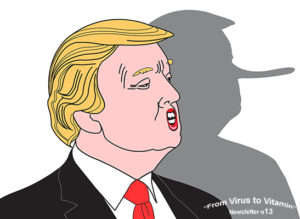OF Discussion Board n°13 – 19 February 2021
 Question asked : “What are the economic lessons that we (or the world) has to retain from the Trump era?“
Question asked : “What are the economic lessons that we (or the world) has to retain from the Trump era?“
Thanks for those of our contributors who ventured to react to the this question posed in this Discussion Board.
Editorial – Trump’s economic heritage: false promises setting the stage for populist disruption
by Virgile Perret & Paul H. Dembinski
|
From trade wars to tax cuts, from low unemployment to booming stock market, ex-President Donald Trump took the American economy on a wild ride, often ignoring the lessons learned by economists during the last 50 years. While his disruptive economic strategy allowed him to reap short-term benefits and appealed to his populist base, it turns out to be politically unsustainable in the longer term.
One of the main policies of the Trump administration is a large tax cut aimed at corporations and higher income households, which was supposed to spur a new wave of investment. This policy, however, has not worked since “the tax cut led to a small temporary boost of growth but primarily resulted in companies buying back their shares. This is not surprising: corporate profits have been high in recent years, and higher income households can anyhow easily access credit. Fiscal policy works best if it provides resources to agents that are credit constrained, such as municipalities or lower income households, who will spend it.” Thus, although Trump campaigned on being the champion of the working man in 2016, his economic policies have led to increase inequalities.
Trade policy is another important area where Trump tried to fulfil his “America First” agenda by launching trade wars with allies and adversaries alike, engaging in tit-for-tat tariffs, reintroducing import quotas, and constraining the World Trade Organization’s dispute-settlement body. The trade war with China has involved “more than 20 announcements during 2017- 2020 of restrictions and truces by both parties.” Ultimately, the war was lost by the US according to many economists. In addition, “the tariffs have not reduced the trade deficit and their primary effect has been to increase the cost of imported goods, a pattern in line with the lessons from economic research.”
Two lessons may be drawn from this economic experience. First, “no nation is an island in our interdependent world. If “America first” is understood as “America alone”, the world economy is at risk of looking like a jungle after a thunderstorm.” Second, “even if the preferential tax cuts, the trickle-down illusion, the aggressive economic policy and the attack on the welfare provisions generates an enthusiastic climate of self-believed development (as it seemed at first for the privileged US citizens) it will eventually hurt the social cohesion. Polarization, violence, racism, riots are the results of thinking that puts aside the common good while “doing business”.”
|
  |

| “… vulnerabilities of large economic areas like EU to US sanctions …”
Twenty-three per cent of global exports at the end of Trump era are still invoiced in US dollars, not counting commodity markets mostly priced in US currency despite US having become in the 4 years of Trump net exporter of hydrocarbons. In addition the Trump years highlighted vulnerabilities of large economic areas like EU to US sanctions policy. As a consequence new takeover policies and new systems for screening foreign direct investment, both meant to restrict exposure to US sanctions and diminish role of dollar, are about to be implemented. An increased resilience of the international monetary system, also based on increased weight of non US investment banks to better focus in times of crisis on domestic markets other than United States, is possible to be observed in the post Trump era.
Eutimio Tiliacos
|
 |
| “… the triumph of American sovereignty … ”
These four years saw the triumph of American sovereignty based on the exorbitant weight of the dollar and the military power. The economic decline of the United States was accentuated in the face of Japan’s aging population, European resistance, Russia’s geostrategic recovery and China’s meteoric rise. The lesson: transforming multilateral organizations (including the IMF) by strengthening the role of SDRs while rebalancing power within the organization. A politically stronger Europe could contribute to the global balance by transferring to the European Union the veto power held by France in the Security Council (UN).
Etienne Perrot
|
 |
| “… the need to place sustainability and social justice at centre of public policy …”
The pandemic has underscored the need to place sustainability and social justice at centre of public policy. The covid-19 recession has put many developing countries and emerging markets in a precarious financial position. Recovery depends on protecting public health, on sustaining human capital, helping individuals to retain employment or acquire skills needed for new jobs. People who are economically vulnerable before a crisis are often most negatively affected by crises and face the toughest recovery. The pressure on policy makers to focus on the short term is immense. However, “next normal” is going to play over. Government leaders at state and local level, can consider futuristic interventions.
Archana Sinha
|
 |
| “… large tax cuts and the imposition of tariffs have not worked …”
The two main economic policies undertaken by the Trump administration are a large tax cut aimed at corporations and higher income households, and the imposition of tariffs on selected imports. These policies have not worked. The tax cut led to a small temporary boost of growth but primarily resulted in companies buying back their shares. This is not surprising: corporate profits have been high in recent years, and higher income households can easily access credit. Fiscal policy works best if it provides resources to agents that are credit constrained, such as municipalities or lower income households, who will spend it. The tariffs have not reduced the trade deficit and their primary effect has been to increase the cost of imported goods, a pattern in line with the lessons from economic research.
Cédric Tille
|
 |
| “… US pre-Covid figures showed an enviable situation … ”
From a macroeconomic point of view – probably due to luck at least as much as to Government action – the US pre-Covid figures showed an enviable situation regarding employment and growth: a “hot” economy with high deficits didn’t cause runaway inflation. From Neil Irwin (NYT Jan 18, 2021): “One of the big plot twists of this era is that Mr. Biden’s plan to make the American economy great again seems to rest on applying the macroeconomic lessons of the Trump era”. Regarding pending structural reform, the end of the Trump era will be remembered as the time when US lawmakers for the first time took aim at big tech with major antitrust lawsuits! Presidential politics not always command economic events…
Domingo Sugranyes
|
 |
| “… no nation is an island in our interdependent world …”
We could draw two negative perspectives and a positive path for the future: A. No nation is an island in our interdependent world. If “America first” is understood as “America alone”, the world economy will look like a jungle after a thunderstorm. The lack of leadership was obvious when the pandemic effects were growing. We still have no probable alternatives to face the new economic crisis. B. Even if the preferential tax cuts, the trickle-down illusion, the aggressive economic policy and the attack on the welfare provisions generates an enthusiastic climate of self-believed development (as it seemed at first for the privileged US citizens) it will eventually hurt the social cohesion. Polarization, violence, racism, riots are the results of thinking that puts aside the common good while “doing business”. The positive path is to recognize through bitter experience that “We cannot solve our problems with the same level of thinking that created them” (Al. Einstein)
Christos Tsironis
|
 |
| “… an increase in terms of re-nationalization …”
With the global financial crisis of 2007-2008 and then with the COVID-19, the world experienced a phase of globalization reduction. As highlighted by Andreas Nölke, there has been an increase in terms of ‘re-nationalization’, for a variety of reasons, including rising costs of delocalization, increased competition within host countries and domestic political dynamics. In particular, Trump docet, populist parties are playing a key role in this process: domestic calculus is a factor in the growing process of re-nationalizations of multinational corporations, as de-localization impact the socio-economic structure of societies. However, if the re-nationalization of multinational corporations is often a “card” played by populist parties to produce mobilization, the results in terms of contrasting the socio-economic effects of globalization are mixed.
Valerio Bruno
|
 |
| “… the legitimization of policy making based on gut reactions …”
Of the many unfavourable lessons I shall single out just two. Firstly the legitimization of policy making based on gut reactions rather than on proper consideration of consequences. Here Trump himself endorsed the powerful movement in the US to delegitimize incorporation of scientific ideas and data in political discourse and policy design. The policies towards climate change and environmental issues more generally now require reversal if they are not to cause long-term damage. Secondly the difficulty or futility of targeting goals regarding a country’s external trade position through measures limited to tariffs and other restrictions on mostly bilateral international trade. This is evident in the trade war with China started by the Trump administration. This war has involved more than 20 announcements during 2017- 2020 of restrictions and truces by both parties – more by the US than by China.
Andrew Cornford
|
 |
 Question asked : “What are the economic lessons that we (or the world) has to retain from the Trump era?“
Question asked : “What are the economic lessons that we (or the world) has to retain from the Trump era?“










